All things must pass. Even, it turns out, the glorious, unrepeatable and by the end strangely interminable reign of Arsène Wenger as manager of Arsenal Football Club. After 22 years in charge Wenger has announced that he will retire at the end of the current season.
It is a departure that has been pencilled tentatively in to the footballing calendar for as long as anyone cares to remember; but which still arrived on Friday morning like a long-delayed bereavement, jamming the phone-in switchboards and flooding social media with the usual mess of rage, regret and irresolvable argument over a hotly contested legacy.
The news of Wenger’s departure came not from his own lips at one of his bi-weekly press conferences but via an official statement – fittingly so for a man entirely bound up in this footballing institution, who almost feels like a physical component of that looming glass and steel super-stadium.
There will now be a sense of deep fascination around Arsenal’s final seven or possibly eight games of the season, a run that would take Wenger up to a mind-boggling total of 1,236 matches in charge. Not to mention, of course, an air of genuine sadness.
Throughout English football’s violent structural changes of the past three decades there has been something reassuringly immovable about that gangling figure with the hawk-like frown, the turban of grey hair, arms flapping at his sides like broken deckchair struts, utterly captivated at all times by the spectacle in front of him.
TimelineArsène Wenger's 22-year tenure as Arsenal manager
Show
Arsenal announce Wenger's appointment
Win 2-0 against Blackburn in Wenger’s first match in charge
Defeat Everton 4-0 to win Premier League title
Beat Newcastle 2-0 to lift FA Cup and complete the double
Wenger offers to replay Sheffield United following controversial FA Cup win
Lost 4-1 on penalties to Galatasaray in Uefa Cup final
Win 1-0 at Old Trafford to win the league title
A 2-2 draw at rivals Spurs confirms third league title win
Beat Leicester 2-1 to complete The Invincibles’ unbeaten season
Final game at Highbury
Defeated 2-1 in Champions League final by Barcelona
Lose 8-2 to Manchester United at Old Trafford
Marks 1,000th game in charge by losing 6-0 at Chelsea
Wins record-breaking seventh FA Cup with victory over Chelsea
Despite defeating Everton 3-1, they finish outside the top four for first time in Wenger era
Announces he will leave Arsenal at the end of the season
Wenger will retire three months short of his 69th birthday, in the process bringing to an end one of the great, transformative, utterly distinctive careers in British sport.
He joined Arsenal in the summer of 1996 from Japanese football as an almost total unknown in this country, an entirely left-field figure, but agreeably intense and jarringly articulate in his fourth language. All this at a time when the idea of a successful overseas manager in England was still likely to draw a frown of weary scepticism.
Fast forward 22 years and during the Wenger era Arsenal have spent £750m, won 16 major trophies and fielded 220 players, almost a third of all players to play for Arsenal. In the process the manager has been the key figure in the total transformation of every part of the club, including the creation of a spectacular era-shifting North London stadium that Wenger took to as though it were his own hard-earned kitchen extension.
More than this Wenger has been both a reforming force in British football and a figure that reached out way beyond the remit of his sport. Those first few years in England are notorious to the point of cliche for the infectious cultural changes enacted around a grand old club that had fallen into a state of lager-stained despond by the middle of the 1990s.
These were the Grilled Broccoli Years, when Wenger strode the footballing landscape like our own thin white duke, bringing yoga and vegetables and a focus on a more refined, technical style to his initially sceptical, ultimately devoted squad of players.
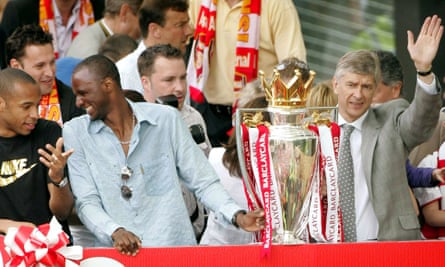
“Is it too much to hope that Wenger will usher in a new age of reason in English football as a whole and not merely at Highbury?” David Lacey wrote in the Guardian when Wenger was first unveiled with remarkable prescience as this is exactly what happened. Clubs everywhere aped the template of advanced conditioning and cosmopolitan staff, ushering in a period of fast-paced enlightenment for a Premier League product en route to global industry domination.
Given this initial zeal perhaps the strangest thing about Wenger is the way his time in English football has pivoted around a single point of paradox. A manager who entered English football as a kind of fire-starter, junking the chocolate bars, taking his sledgehammer to a century of ossified certainties, has ended up dismissed by many as a stick in the mud, left-over and all-round emblem of pig-headed stasis.
On the pitch Arsenal have undoubtedly declined in recent years, slipping form the edge of the European elite to a diminished position on the fringes despite some recent domestic trophies. Off the field Wenger has continued to run a brilliantly tight ship, leaving for his successor, and indeed his well-remunerated board, a set of well balanced books and an infrastructure that is sparklingly up to date. Despite this there has been a gathering unrest at the one-sided nature of this deal, the lack of a more reckless lust for glory in favour of steadiness and slow decline.
The past few seasons have seen public protest, much-publicised fan-TV rants and even the silly but still quite funny proliferation of Wenger Out banners at events around the world, from political marches in South Africa to rugby matches in New Zealand. Wenger has been changed by this a little. A manager who came to England kicking against the pricks has tended to sniffing against the new and the short-term in recent years. Wenger talking with a sigh about the fact that “we live in a world where people always want instant results/new things/perfection” has become a part of his own press conference bingo for a pack of occasionally exasperated but ever affectionate London football journalists.
It is a separate judgment on the short-termism of English football’s celebrity news-style culture that nobody seems quite sure what kind of farewell one of the great English football managers can expect from here. Will there be hordes, a procession, a vast pile of flowers, an extended Viking funeral?
It is to be hoped that history will cast Wenger’s time in England not as one of late-breaking angst, but as the love story it was so clearly at the outset.
Players will remember Wenger’s charm and wit, his famously lively dancing (his status as Arsenal’s top choice as manager all those years ago was confirmed during a raucous dinner party in the company of the former vice-chairman).
Fans might prefer to recall a football manager who helped construct not just a stadium but a new training ground and a modern, re-geared globally renowned sporting club.
Quick GuideArsène Wenger's Arsenal honours
Show
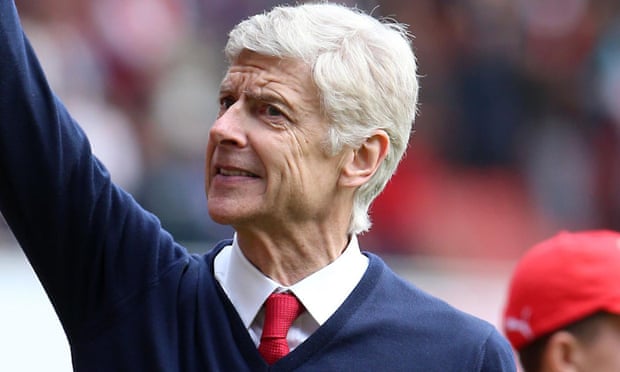
Premier League (3): 1997-98, 2001-02, 2003-04.
FA Cup (7): 1997-98, 2001-02, 2002-03, 2004-05, 2013-14, 2014-15, 2016-17.
Community Shield (6): 1998-99, 1999-2000, 2002-03, 2004-05, 2014-15, 2015-16.
Premier League Manager of the Season (3): 1997-98, 2001-02, 200-/04.
League Managers' Association Manager of the Year (2): 2001-02, 2003-04.
BBC Sports Personality Coach of the Year (2): 2002, 2004.
Premier League Manager of the Month (15)
Beyond this Wenger will stand as perhaps the last of English football’s great Napoleonic managers. The century-old fascination with the manager as something bound into the fabric of club and community, a magnetic force of benevolent personality has pretty much run its course, or at least been replaced by a more short term version.
Nobody will manage a top-level club across three decades again. No one person will become quite so closely wound around the basic structure of these grand old Victorian social institutions, transformed now at the highest level into distantly-run PLCs.
Wenger has been part of that change, just as Arsenal is now a club whose staff and business model reflect the priorities of the City financial institutions a few miles down the road. He will remain in the sport, whether as manager advisor or simply waspish TV pundit. For now English football simply owes its departing general the correct, suitably fond, suitably grateful farewell.
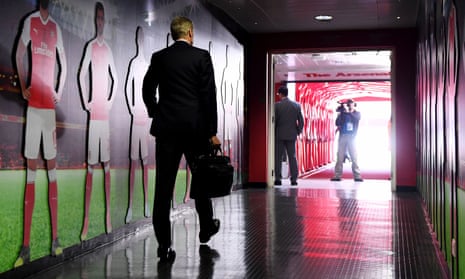

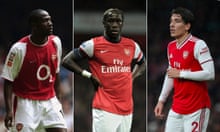


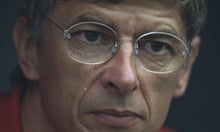


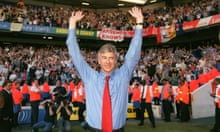
Comments (…)
Sign in or create your Guardian account to join the discussion